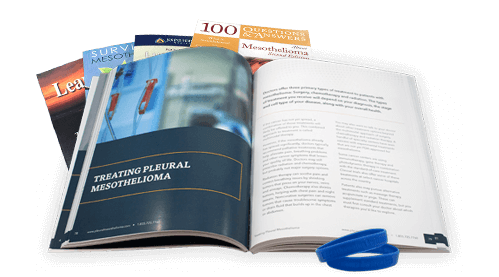Nutrition is important to mesothelioma patients for one reason: Impact on prognosis.
Patients who maintain their weight and eat well before, during and after mesothelioma treatment do better than their poorly nourished peers.
- Protein is critical for maintaining your strength and giving your body the material needed to weather the stresses of treatment and recover.
- Calories provide the tools required to put the protein — the building material — to work. Calories provide energy. This allows your body to rebuild new red and white blood cells, platelets, muscle, bone and other tissues from dietary protein.
Nutrition Before Treatment
One early sign of mesothelioma is weight loss. Before a diagnosis, losing weight without trying can signal something is wrong in the body.
Unfortunately, losing weight without trying can compromise the body’s ability to recover from medical procedures and treatments.
Authors in a 2018 study published in the Journal of Oncology Practice noted 34 percent of cancer patients have already experienced weight loss by the time they receive a diagnosis.
Avoiding weight loss before treatment will keep your body ready for whatever cancer therapies your mesothelioma doctor deems best for you.
Nutrition Action Items to Prepare for Treatment
- Avocados
- Peanut butter, almond butter and other nut butters
- Nuts and seeds
- Olive, canola, sesame, peanut, walnut and avocado oils
- Fruit and unsweetened dried fruit
- Starchy vegetables (sweet potatoes, potatoes and squash)
- Whole grains (brown rice, oatmeal, rye, whole wheat and quinoa)
- Chicken and turkey
- Fish, including oily and cold-water options (sardines and salmon)
- Lean beef and pork
- Legumes (beans, peas, lentils and chickpeas)
- Plain Greek yogurt with chopped fresh fruit added for flavor
- Nuts and seeds
- Milk and milk powder added to beverages for a protein boost
- Whey protein powder-based smoothies
- Whole eggs
Nutrition During Treatment
During mesothelioma treatment, you may experience side effects that diminish your ability to eat your usual diet. Focus on ways to get as much nutrition as possible into each bite.
Proper nutrition during treatment can decrease the severity of side effects and increase the likelihood that you are able to receive all planned therapies.
Maintaining weight helps you cope with the physical and emotional stresses of treatment.
Nutrition Action Items During Treatment
Focus on protein and calories, as you did with the time before treatment.
- Whole-fat milk with dry milk powder added
- 100 percent fruit juice
- Smoothies made with whey protein powder, milk or Greek yogurt
- Omelets, soups and casseroles with added cheese and cooked meats
- Plant-based milk (soy, almond, cashew, hemp) with protein powder added (if not tolerating regular milk)
- Sweet and salty items whenever they sound appealing, such as having eggs for dinner or chicken soup for breakfast
- Cheese, nut butters or roasted nuts
- Ice cream-based smoothies and milkshakes
- Egg-based desserts (cheesecake, custard, pudding)
- Instead of three larger meals per day, try multiple small meals and snacks.
- Have a few bites of any food every 60 to 90 minutes.
- Reduce mealtime stress by explaining your new nutrition needs to family and friends.
- Reset expectations for how much you can eat at one time to minimize well-intended, but stressful advice that you “need to eat more.”
- Create a new time to catch up with family to keep mealtime away from discussions of politics, finances or other “hot button” topics.
Nutrition After Treatment
Continue following tips for eating during treatment until you begin to feel better and get your strength back.
After treatment symptoms and side effects have subsided, move your focus to eating for recovery.
Proper nutrition after your surgery will also replace blood loss and increase your level of energy. Post-operative care and nutrition are important considerations for patients returning to normal health.
Nutrition Action Items After Treatment
This will allow for recovery of strength and immune function.
- Chicken, turkey, fish, eggs and beans
- Greek yogurt and milk with dry milk powder added
- Fresh fruit smoothies made with whey protein powder or ice cream
- Other protein powders and nondairy milks if dairy is hard to digest
- Nuts and nut butters
- Bright red and purple berries, blueberries and cherries
- Green vegetables (kale, broccoli, romaine lettuce, celery, chard, spinach, collards, cabbage, beans)
- Red, yellow and orange vegetables (tomatoes, carrots, radishes, beets, oranges, bell peppers, lemons, sweet potatoes, corn, squash)
- Bananas and apples
- Avocados
- Olive oil and other plant-based oils
- Nuts and seeds
As always, consult your doctor and dietitian with any changes in your diet or ability to eat.
Consult with your medical team if you have questions about what you should be eating before, during or after pleural mesothelioma treatment.



